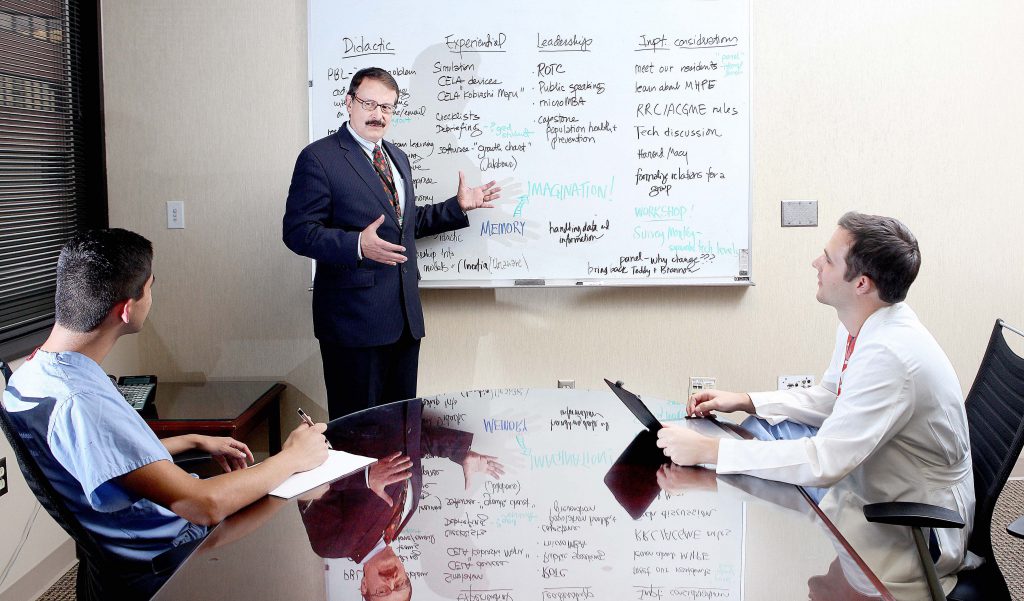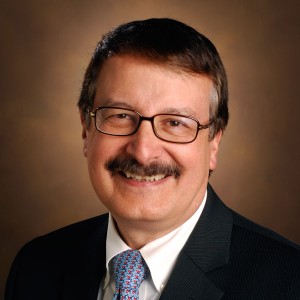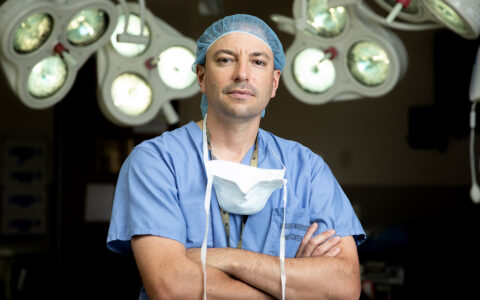Residency programs equip trainees to practice medicine, but not always to be doctors, says Roland Eavey, M.D., Guy M. Manness Chair and Professor of Otolaryngology and chair of the Department of Otolaryngology at Vanderbilt University Medical Center. Nearly a decade ago, Eavey recognized that resident training in otolaryngology was falling short of teaching the leadership and communications skills that were increasingly important to working physicians. The four-year leadership curriculum that Eavey developed since then has been recognized for innovation by the Harvard Business Review and continues to draw attention from peer programs nationally interested in its unique success.
Below, Eavey describes how leadership and management skills have been interwoven into Vanderbilt’s otolaryngology residency, and how that focus is helping cultivate more confident, successful physician leaders.
Discoveries: What motivated you to develop this unique component of the residency training here in the Department of Otolaryngology – this leadership focus that runs throughout your residency curriculum?
Eavey: We’re in our ninth year of leadership training today. Years ago, when I got a master’s in healthcare management, they kept referring to us as leaders. Of course, doctors are leaders – we’re the ones who write the prescriptions and give the orders – but I realized we must be leaders beyond that, as well. The word “doctor” does not mean “healer,” it means “leader” and “teacher.”
When I arrived at Vanderbilt, we weren’t intentionally talking to anybody about being a leader during the residency training program, or even on faculty. I wanted to start a program. I chose two areas that emphasize leadership in our society: the military, where they emphasize the word “leader” often, and when you get an MBA. We started a four-year training program. The first year is military leadership, but it’s not how to fire a bazooka or do a left-face. It covers topics like, “How do you establish trust?,” “How do you work in teams?,” “How do you work under stress?”
The second year is public speaking, a skill that physicians need but don’t realize it because they speak all the time to people. The third year is a micro MBA year. The fourth year is a capstone project focused on prevention and public health. Typically, in medical school we focus on treating the patient who walked in the door with a disease; we don’t focus on how to keep that patient healthy in the first place.
That’s the four years. We have a five-year training program in total: after that first year of the surgical internship, we offer this program on a rotating basis.
Discoveries: Is this something that every resident completes? Is it happening in other otolaryngology programs?
Eavey: All otolaryngology residents get this training here at Vanderbilt. This is a very rare kind of training, I’m learning. Duke has this in orthopedics, but that is all I’ve encountered. I’ve had inquiries from other otolaryngology departments interested in replicating the program.
Discoveries: What exercises from across the four years have proven most valuable to residents? What turns on a lightbulb?
“Practicing medicine is a team sport, but we don’t always train on team organization, team interaction, change management — things needed in a team ecosystem.”
Eavey: The military component asks them to think consciously about the importance of teams. Practicing medicine is a team sport, but we don’t always train on team organization, team interaction, change management — things needed in a team ecosystem. We also focus on strength-space leadership. Every individual has certain strengths, but when you ask residents to sit down with a list of adjectives, all different skill sets surface. How do you use skills that you may not realize you have?
The public speaking component is a lot of practice. We first analyze speeches. We go on YouTube and ask, “How was the Gettysburg Address organized?,” “What’s the story?,” “Did they use the power of three, other speaking techniques?” Then, all residents have to perform three talks in front of the group, with or without PowerPoint, in order to be critiqued in a safe environment. They get back comments, neutralized observations, not criticisms. They can feel comfortable.
The third year, the micro MBA, teaches business and organization skills that most do not teach in medical school or residency. What are funds flows? What about conflict management? What about uncomfortable conversations you will need to have? We’ve had a minister come in for that element. We had an Air Force colonel come in to discuss decision-making. In medicine, you want to use the most evidence-based treatment for your patient, but you often have a deadline or incomplete information. We cover other topics related to the micro MBA, such as operations management, organizational behavior, marketing, strategy and governance.
For the capstone project, we’ve made cartoons. The first was about head-neck cancer, and the second was how to avoid hearing loss. These are now on the department YouTube channel.
Discoveries: What types of responses do you get, either from former residents who have moved on in their medical training or from peers interested in the program?
Eavey: Harvard Business Review had an article about the value of teaching physician leadership and management that featured our program. And we’ve had a great deal of interest from peers. Our residents, I believe, feel it is worthwhile. They would let you know if it wasn’t. We believe it’s appealing for many resident applicants.
As for those who have left the program, I’ll give an anecdote. Someone finished a residency, then a fellowship and went into a facial plastics position in a glamorous city. She was struggling with the challenges of all the things you’re not trained to handle — personnel issues, whether procedures should be done if there’s not enough strong evidence. She said two things helped her in the real world: the fact that she’d been captain of a basketball team, and the leadership training program she completed here during her residency.
Discoveries: How do you see this program fitting into the larger landscape of medical education where hospitals and health systems are finally thinking about issues like physician burnout, and how to support well-rounded professionals?
Eavey: The information we teach physicians changes so fast — it’s not carved in a stone tablet — that we have to continue to be lifelong learners. Issues like leadership, public health, things one could learn in an MBA, information technology — the question is not only how do you incorporate them into graduate medical education, but how do you incorporate them into continuing medical education? I think the profession as a whole is still nascent on this process. We don’t assume that you can just take out somebody’s appendix without having trained, but we somehow assume that leadership and population health will just happen. We have to be intentional and consistent, and we have to keep pumping the pedals on the bicycle.





